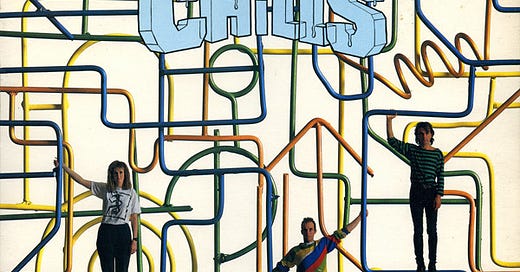"Why aren't you mine?" The Chills' Brave Words revisited
The tragedy and triumph of the late Martin Phillipps.
The following is an article I wrote for a Forgotten Classics section of my early html version of ijamming-dot-net, almost a quarter century ago, and itself long lost to the mists of time. Unearthed in honor of the late Martin Phillipps, I have edited it somewhat for grammar/accuracy and have added some footnotes for relevance. I have also added a relatively detailed postscript that follows the Phillipps/Chills story to its finale. The full post, which runs over 3000 words, is available to paid subscribers, whose support keeps the lights on and the engines running - and to whom, thank you. Subscription gets you access to all of the twice-weekly posts all the time, exclusive articles like this along with multiple interview transcripts, plus the Crossed Channels podcast with
, Ep 9 dropping next week. You can subscribe for just $5/£4 a month or $50/£40 a year.The idea for this section came from rediscovering boxes of cassettes that had been languishing in the basement of my house. The only copy of the Chills' Brave Words I've owned all these years has been an unmarked Maxell XLII 46-minute cassette, which I must assume was an advance tape I got from Rough Trade, the label that I believe financed this album in the UK in the summer of 1987. Laying lie to the fact that cassettes rapidly disintegrate - but certainly proving that it's worth the extra pennies to buy chrome - this tape has stayed in excellent shape over the years. I can no longer imagine hearing the album any other way,[1] and as it turns out, I probably never will.1 Periodically, I've packed it up with other unruly cassettes, but with equal regularity it seems to keep finding its way back into rotation. When I came across it again over the Christmas holidays just passed [either 1999 or 2000], I knew it was destined for this section.
The Chills formed in 1980 in Dunedin, the college town and musical hotbed on the South Island of New Zealand; they became the flagship group for Dunedin’s ongoing record label, Flying Nun, which itself was established in ‘81. From the beginning, the Chills served as the creative outlet for, and was led by, singer-songwriter guitarist Martin Phillipps, who became famous for changing line-ups seemingly with every full moon; the group that made this debut album was line-up number nine (or was it ten?), and featured drummer Caroline Easther, bassist Justin Harwood and keyboard player Andrew Todd, all of whom also sung backing vocals.
By this time, news of the band's greatness (and Phillipps always intended it to be a band, despite members coming and going) had spread steadily from their New Zealand homeland to my London hometown, and a compilation album Kaleidoscope World had been released on Creation in 1986. It was good timing: the Chills had a jangly guitar sound that endeared them to British audiences still in the throes of the C-86 mini movement, but hailing from New Zealand afforded them a separation from all trends except those which has frequently permeated Kiwi indie guitar music - a depth of lyrical content, a love of twisted melodies, and a desperate yearning at the heart of each song.
In fact, as its title suggests, Brave Words is - let's use the present tense for music that still sounds so alive - a fearless confessional. The agenda, both musical and lyrical, is set with the opening song 'Push,' which begins with a brief flurry of said jangly guitar, gradually introduces a melodic bass line, some organs and drums (nothing too fancy, just a nice easy groove) and then a vocal that is harmonized throughout - but from lower down the scale rather than higher, serving to create an ominous mood. "First you push me this way and then you push me that way," Phillipps complains of the emotional tug of war at the heart of all relationships, concluding "So now I'll push you too," all the while emphasizing the "s" of "push" (a sound most recording engineers spend hours trying to eradicate!) as if hissing at his partner. A second verse repeats much of the first ("I always needed you so desperately...You sure know how to make things hard,") at which, point made, a second chorus is passed up and the song ends, one minute and forty-four seconds short. It's an abrupt, understated, thrilling start.
Most streaming versions of Brave Words, including the official releases on YouTube, run 15 songs per the initial CD release. CDs were still relatively new in 1987-88 and record labels were playing with formatting ideas. As Discogs can confirm, the original vinyl LP - and my advance cassette - was confined to just 12, which is how I prefer listening to Brave Words. You can do the same via the Qobuz platform as below:
The subsequent 'Rain' introduces more Chills trademarks: stop-start rhythms that follow the vocals, and the sound of Phillips raising his voice an octave - or at least from a whisper to a scream - in mid verse. On 'Speak For Yourself' his voice leaps in immediately as if the message (a far more optimistic "These are the best of times") has to get out before the instruments get in the way. 'Look For The Good In Others and They'll See The Good In You' is almost a tribute to 1978-79 period Buzzcocks, from lengthy title through "fa-la-la" singalongs, tinny guitar solo and Shelley-esque high-pitched lyrics ("I used to be in love but that was long ago"), only escaping charges of plagiarism through use of that distinctive fairground organ sound. Many Chills fans consider this the album's melodic highlight; for me, it has only ever been a precursor to the song on which Phillipps truly establishes his songwriting genius, ‘Wet Blanket.’





